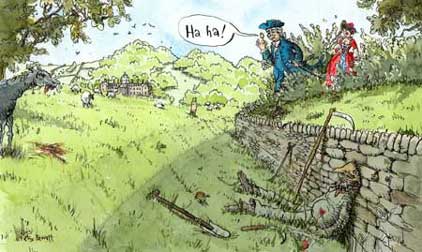How different cultures Laugh online? Educate your e-laugh
According to a Facebook survey, since 2015 only 33% of online users preferred emojis to express laughter and 1.9% reverted to the once trendy acronym “laughing out loud” (LOL). Instead people are “HAHA”ing all over social media platforms. More than half of all online users will e-laugh today not realizing that sometimes their laugh doesn’t translate in another person’s culture.
1. HA-HA – the origin of the word in English dates back to 17th Century and has no comedic routes as one would expect. In fact you may still often see ha-has in the British estates which consist of a sunken wall with its top at garden ground level that stops cattle from getting into family gardens without obstructing the view ( see photos above). Now.. I doubt if you would stumble over this ha-ha fence at night it was anything but “haha” funny. So is important that you don’t confuse HA-HA with HAHA in England!
2. jajajaja or jjjj – In Spanish, J is pronounced like H so jajaja is the analog of hahaha in English. Be aware of sending this to an Indian though as jaja in Hindi means “go away”
3. www – is not world wide web but a Japanese person e-laughing. This has two possible origins. One is the Japanese words for laugh or smile :"warau" (笑う) or "warai" (笑い) and the other is the way the letter looks like an upturned face—a motif echoed in the country's internet meme characters, like "Yaruo"
4. 55555- Thai people pronounce the number five as “haa” so it sounds like “ha”. So a Thai person typing “555” is the translation of the “ha ha ha” e-laughter. Many fives “55555555555” or many fives with plus sign(s) “55555555+(+)” can be used for something very funny. However as the number five in Mandarin is pronounced as wu – the Thai laughter in Chinese becomes “wuwuwu” which is the equivalent of “boohoo” or crying in China.
5. kkk – again is not the Ku Klux Klan but a Korean person e-laughing. ㅋㅋㅋ ("kkk") and ㅎㅎㅎ ("hhh") are usually used to indicate e- laughter in Korean. 'ㅋ', is a Korean Jamo consonant representing a "k" sound, and 'ㅎ' represents an "h" sound. Both "ㅋㅋㅋ" and "ㅎㅎㅎ" represent laughter which is not very loud. However, if a vowel symbol is written, Laughing out Loud is implied: 하하 "haha" 호호, "hoho."
6. huehuehue/ kkkkk/ rsrsrs/ - Brazilians have plenty of ways of representing something was funny when e-laughing. K is pronounced ka in Portuguese. Brazilians think laughing sounds like kakakakakakaka or huehuehue. So while some western cultures might perceive someone saying kkk as rude and trying to say ok ok ok and get rid of the topic….they are actually laughing. Also rsrsrs comes from rs which is the acronym for risos (=laughter)
7. ههههه/ hhhh – Arabic doesn’t write short vowels so that is the Arabic letter for H but it can still be read as “hahaha”. You may also find Arabs writing “kkkk”.
8. wkwkwk/ wakaka /xixi – is imitating Donald Ducks laughter in Indonesia. In 1990’s era, the first booming era of computer using in Indonesia, many university students like to mock their friends with Donald Duck laughing style in daily conversation. And when they started playing online computer games, they brought that laughing style with them to mock their opponents. Furthermore, the letter “w” pronounces “we” (w-eh) in Indonesian language so “wk” becomes the sound “wek”.
9. MDR / héhé /hihi/ hoho – French use variations of laughter and have translated their own LOL which is MDR = “Mort De Rire” (dying of laugher)
10. xaxaxa / xoxox – is not hugs and kisses …in Cyrillic alphabet x is h. So you will see this in some Russian speaking countries as well as Greece; for the same reason (X=H)
11. Rrrrrr – Both in Ukraine and Russia, “бгггггг” or “гггггг” (‘bgggggg’, ‘ggggggg’) are used to indicate giggle.
12. Rá! – Portuguese equivalent of Hah! They can also use the “rá-rá-rá” expressed three times, with a pause in between, and the ‘r’ pronounced as it is in Spanish for an ironic laughter, when you do not find something funny, and you wish to express this, not laughing, but pretending that you are laughing.
13. *asg* - is not “Awkward Social Gathering” nor a gasp for air is actually an abbreviation of the word “asgarv” which means ‘intense laughter’ in Swedish.
14. EK number – All Emirates crew have had to fill a number on a form that asked for their EK (emirates) flight number exactly the same way. Well there is the special mind blowing fact for all my fellow colleagues. EK in Hindi is the number 1. So when someones says ek number is a way to acknowledge that your joke was funny (“I rate this number one”) This is especially used in Mumbai where people love to rate every good thing as Ek Number.
15. xaxa / бгггггг (bgggg)/ гггггг (gggggg)/ хихи (hihi) / xexe (hèhè) – and people from Belarus might win the competition of variations for e-laughters.
Always be kind,
Andreea Stefanescu



